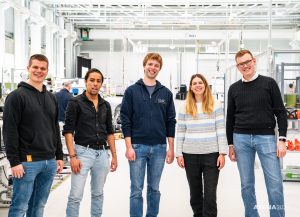STUTTGART — During a recent visit to Q.ANT, Germany’s Vice Chancellor and Federal Minister for Economic Affairs and Climate Action, Robert Habeck, sought to explore the country’s role in the global chip industry. The visit focused on the future of sustainable AI computing, highlighting Q.ANT’s pivotal role in shaping Germany’s photonic AI chip industry. This marks another significant moment in Q.ANT’s mission to revolutionize energy-efficient computing technologies.
Accompanying the Minister were Anna Christmann, the Federal Government Commissioner for Digital Economy and Start-ups, Baden-Württemberg’s Science Minister Petra Olschowski, and Transport Minister Winfried Herrmann. At the Stuttgart-based startup, Q.ANT showcased its innovative photonic-based processor, the first of its kind, which is designed and produced entirely in Stuttgart—from wafer fabrication to integrated server solution.
The visitors were given an exclusive live demonstration of the breakthrough technology, which promises impressive advancements, including a 30-fold increase in energy efficiency and a 50-fold boost in computing power. A key advantage of this new technology is its ability to leverage existing chip factories from the 1990s, which can be repurposed for photonic chip production. This offers substantial cost savings and paves the way for greater national independence in chip manufacturing, with infrastructure available for deployment worldwide.
Dr. Michael Förtsch, CEO of Q.ANT, emphasized that the company is laying the groundwork for a sustainable, next-generation AI chip industry that will have a global reach. “Our technology tackles two of the biggest challenges in AI: the rising energy demands and the need for more efficient computation of complex tasks,” he explained.
For the future, Förtsch envisions Q.ANT’s photonic processors replacing traditional graphics cards currently used for AI workloads, becoming a central component in the evolution of computing systems. He noted, “The future of data processing will require a seamless integration of different chip technologies. Our photonic solutions are designed to integrate perfectly with existing high-performance computing systems, working in conjunction with traditional semiconductors such as CPUs, GPUs, and ASICs.”
Entering a billion-dollar market, Q.ANT’s photonic chip technology is positioned for significant growth. Analysts foresee strong demand for AI chips, AI accelerators in servers, and photonic integrated circuits. Q.ANT is committed to developing solutions that not only drive innovation but also promote ecological responsibility.
For more information about Q.ANT and its Photonic Computing solutions, visit https://qant.com/photonic-computing/.



















